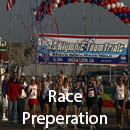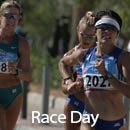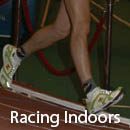How to Race - Race Preparation
Nutrition Around Race Day
Your diet before race day, during race day, and slightly after race day must differ slightly from your norm.
Carbo-Loading
When athletes think of the pre-race dinner, they often think of carbo-loading. Unfortunately, the term carbo-loading gets thrown around so much, its true meaning is foggy. Traditionally, carbo-loading requires depleting carbohydrate reserves by eating a high-protein low-carbohydrate diet in the days leading up to a marathon.[1] Then right before the marathon, a racer consumes large amounts of complex carbohydrates to trick the body into storing more than its normal amount of glycogen. The extra glycogen helps fuel the last few miles of the marathon. This process is stressful to the body. I recommend avoiding it unless you are a very serious athlete.
Instead use common sense. Eat normally in the days leading up to the race. Ensure that you are properly hydrated and top off your tank with a nice complex carbohydrate meal of pasta the night before the race.
[1] Carbo-loading is mainly used for races of marathon length or longer. There is little benefit to traditional carbo-loading until you walk at least 20 miles.

Never try something for the first time right before or during a race. Experiment with nutritional supplements, different foods, or electrolyte drinks during your training. What works for another athlete may not work for you.











